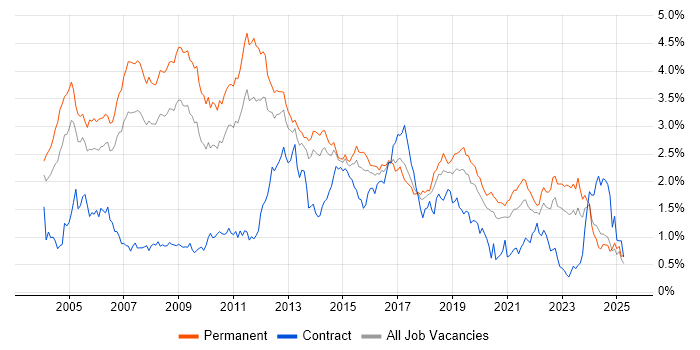Relational Database
England > Yorkshire
The table below provides summary statistics and salary benchmarking for jobs advertised in Yorkshire requiring Relational Database skills. It covers permanent job vacancies from the 6 months leading up to 14 January 2026, with comparisons to the same periods in the previous two years.
| 6 months to 14 Jan 2026 |
Same period 2025 | Same period 2024 | |
|---|---|---|---|
| Rank | 134 | 133 | 116 |
| Rank change year-on-year | -1 | -17 | +32 |
| Permanent jobs citing Relational Database | 29 | 19 | 65 |
| As % of all permanent jobs in Yorkshire | 0.86% | 0.61% | 1.96% |
| As % of the Database & Business Intelligence category | 7.27% | 5.01% | 8.89% |
| Number of salaries quoted | 18 | 14 | 63 |
| 10th Percentile | £34,125 | £41,625 | £30,000 |
| 25th Percentile | £38,438 | £42,500 | £42,500 |
| Median annual salary (50th Percentile) | £48,750 | £48,750 | £50,000 |
| Median % change year-on-year | - | -2.50% | -28.57% |
| 75th Percentile | £67,188 | £59,375 | £61,875 |
| 90th Percentile | £80,625 | £65,422 | £83,245 |
| England median annual salary | £57,500 | £62,500 | £60,000 |
| % change year-on-year | -8.00% | +4.17% | -7.69% |
All Database & Business Intelligence Skills
Yorkshire
Relational Database falls under the Databases and Business Intelligence category. For comparison with the information above, the following table provides summary statistics for all permanent job vacancies requiring database or business intelligence skills in Yorkshire.
| Permanent vacancies with a requirement for database or business intelligence skills | 399 | 379 | 731 |
| As % of all permanent jobs advertised in Yorkshire | 11.82% | 12.17% | 22.08% |
| Number of salaries quoted | 248 | 224 | 571 |
| 10th Percentile | £26,250 | £31,250 | £31,125 |
| 25th Percentile | £35,000 | £40,750 | £42,407 |
| Median annual salary (50th Percentile) | £55,117 | £52,500 | £50,000 |
| Median % change year-on-year | +4.98% | +5.00% | -13.04% |
| 75th Percentile | £75,000 | £67,813 | £65,000 |
| 90th Percentile | £85,000 | £82,500 | £84,000 |
| England median annual salary | £60,000 | £65,000 | £60,000 |
| % change year-on-year | -7.69% | +8.33% | -5.51% |
Relational Database
Job Vacancy Trend in Yorkshire
Historical trend showing the proportion of permanent IT job postings citing Relational Database relative to all permanent IT jobs advertised in Yorkshire.

Relational Database
Salary Trend in Yorkshire
Salary distribution trend for jobs in Yorkshire citing Relational Database.

Relational Database
Salary Histogram in Yorkshire
Salary distribution for jobs citing Relational Database in Yorkshire over the 6 months to 14 January 2026.
Relational Database
Job Locations in Yorkshire
The table below looks at the demand and provides a guide to the median salaries quoted in IT jobs citing Relational Database within the Yorkshire region over the 6 months to 14 January 2026. The 'Rank Change' column provides an indication of the change in demand within each location based on the same 6 month period last year.
| Location | Rank Change on Same Period Last Year |
Matching Permanent IT Job Ads |
Median Salary Past 6 Months |
Median Salary % Change on Same Period Last Year |
Live Jobs |
|---|---|---|---|---|---|
| West Yorkshire | -16 | 20 | £61,250 | +36.11% | 8 |
| South Yorkshire | +4 | 3 | £40,000 | -34.65% | 2 |
| North Yorkshire | +3 | 3 | £54,250 | -9.58% | 4 |
| East Yorkshire | -3 | 2 | £61,250 | +75.00% | 1 |
| Relational Database England |
|||||
Relational Database
Co-Occurring Skills & Capabilities in Yorkshire by Category
The following tables expand on the one above by listing co-occurrences grouped by category. They cover the same employment type, locality and period, with up to 20 co-occurrences shown in each category:
|
|
||||||||||||||||||||||||||||||||||||||||||||||||||||||||||||||||||||||||||||||||||||||||||||||||||||||||||||||||||||||||||||||
|
|
||||||||||||||||||||||||||||||||||||||||||||||||||||||||||||||||||||||||||||||||||||||||||||||||||||||||||||||||||||||||||||||
|
|
||||||||||||||||||||||||||||||||||||||||||||||||||||||||||||||||||||||||||||||||||||||||||||||||||||||||||||||||||||||||||||||
|
|
||||||||||||||||||||||||||||||||||||||||||||||||||||||||||||||||||||||||||||||||||||||||||||||||||||||||||||||||||||||||||||||
|
|
||||||||||||||||||||||||||||||||||||||||||||||||||||||||||||||||||||||||||||||||||||||||||||||||||||||||||||||||||||||||||||||
|
|
||||||||||||||||||||||||||||||||||||||||||||||||||||||||||||||||||||||||||||||||||||||||||||||||||||||||||||||||||||||||||||||
|
|
||||||||||||||||||||||||||||||||||||||||||||||||||||||||||||||||||||||||||||||||||||||||||||||||||||||||||||||||||||||||||||||
|
|
||||||||||||||||||||||||||||||||||||||||||||||||||||||||||||||||||||||||||||||||||||||||||||||||||||||||||||||||||||||||||||||
|
|
||||||||||||||||||||||||||||||||||||||||||||||||||||||||||||||||||||||||||||||||||||||||||||||||||||||||||||||||||||||||||||||
